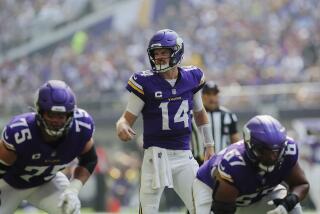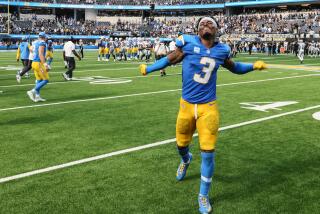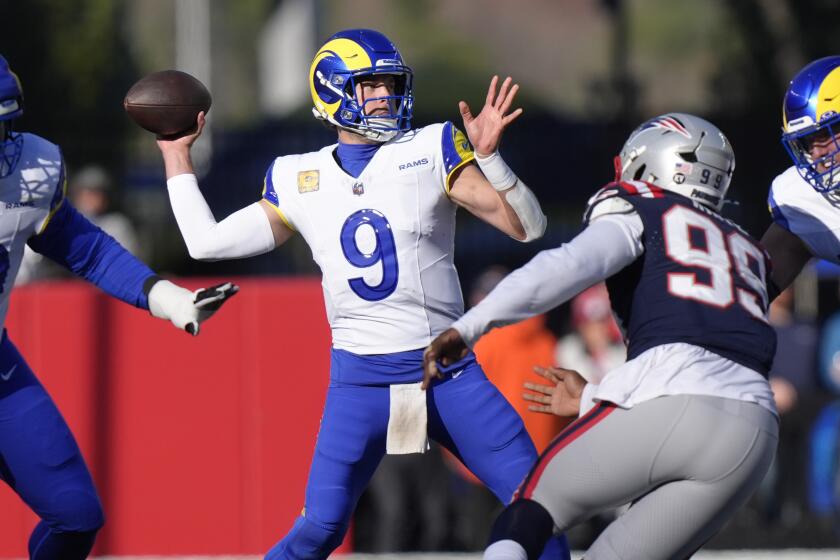McNair Is NFL’s Best
The Tennessee Titans, than whom few football teams are more conservative, have always preferred runs to passes. But their famous old runner, Eddie George, who is averaging a bleak 2.9 yards this season, can’t move them now. Neither can any other Titan runner.
So, reluctantly, lacking any better option, the Titans have asked passer Steve McNair to do it. And that simple change has turned McNair into pro football’s Player of the Year, as you can see when 7-2 Tennessee entertains 2-7 Jacksonville next Sunday.
That isn’t the way Titan Coach Jeff Fisher envisioned the season.
Fisher hoped George would come back from an off year with a big year.
The very last thing Fisher wants is a passing team. But when you can’t run, you obviously have to throw it. And as the Titans trounced Miami in a Week 10 headliner, 31-7, McNair, who’s played this well for years, was the offense as usual Sunday, advancing the Titans to their decisive early three-touchdown lead with one well-directed pass after another.
Fisher, a 23-16 loser in Super Bowl XXXIV, could have upset the Rams that day if he’d played that game this way. But with McNair and George both then available, Fisher, until it was too late, kept giving the ball to George.
Play-Calling Makes the Difference
THE SAN DIEGO CHARGERS might not be able to show Denver next Sunday that they’ve finally learned how a smart pro club can win. For Denver is too tough. But last week, in a 42-28 upset, the Chargers showed Minnesota.
With 41-years-young Doug Flutie at quarterback, they proved that wise play selection makes all the difference in football.
Flutie’s coach, Marty Schottenheimer, one of the NFL’s soundest overall — except, perhaps, as an offensive strategist — let his little old quarterback call most of his own plays that day, according to several of Flutie’s teammates. And though the plays were the same ones San Diego had used to lose seven earlier games, they were astonishingly effective as rearranged according to Flutie’s priorities.
Calling a bunch of early-down passes and late-down misdirection runs, Flutie, who completed 21 of 29 for 240 yards, used running back LaDainian Tomlinson as a counterpuncher — instead of a heavy-duty power runner, his usual role — and got 162 yards out of Tomlinson on only 16 carries.
The veteran quarterback set the stage on his first series, throwing three times to receiver David Boston on San Diego’s first six plays and calling Tomlinson’s number only once in that span. In prior Charger appearances this season, Tomlinson was normally seen four or five times in such a series and Boston not at all despite his standing as one of the great AFC receivers.
Anyhow, with a surprise 7-0 lead, Flutie, making note of the Vikings’ hectic, impromptu pass-defense changes, soon slipped the ball to Tomlinson for a 73-yard touchdown run and a 14-0 lead. And before the first quarter was half over, Flutie had taken over, winning with the most reliable football formula: a pass when the opponents expect a run, and a run when they anticipate a pass.
First Down Best Passing Down
THE OAKLAND RAIDERS used to win Flutie’s way in the old days when Hall of Famer George Blanda, then well into his 40s, came in as a relief pitcher once in a while to win a game that starting quarterback Ken Stabler seemed to be losing. Blanda did it with the same plays other Raider passers used. He simply called them in a different order.
“Play-selection makes the biggest difference in winning and losing,” Blanda once said after 25 years of playing, and studying, the game. By play-selection, he said, he meant: “When, where, and why you run or throw the ball and who gets to run or catch it.”
Thus, Blanda preferred to throw on first down because, he said, NFL defensive players must on first down always be positioned for either a run or pass — meaning their linebackers are less likely to blitz the passer on that down, which means that passers are less likely to get hit on that down. And no passer asks to get hit.
Similarly, in the Minnesota game, Flutie was throwing first-down passes — sometimes even first-down dunk stuff that was often good for a few yards — making everything else possible: from Tomlinson’s runs on second down to reverses on third down as well as Flutie’s trademark jump passes and surprise short quarterback runs for two touchdowns.
It wasn’t Flutie who won the game, it was Flutie’s play-calling. The Chargers could have won that day with their other passer, Drew Brees, if Flutie had called the plays.
The 2003 Raiders, meanwhile, awkwardly pursued an opposite strategy Sunday against the New York Jets. Instead of mixing in passes with runs, as Flutie did, the Raiders ran on nearly every down against the NFL’s 32nd-best rushing defense. But so doing, they could never get far enough ahead to hold off the Jets, who finally caught them, then beat them, 27-24, in overtime.
Eagles Win Wild Monday Nighter
THE PHILADELPHIA EAGLES’ banged-up quarterback, Donovan McNabb, still recovering from three injuries, was the star of the game, setting up the two winning touchdowns with slick passes and then scoring or passing for both in the last nine minutes of a stormy Monday night at Green Bay, 17-14.
In the first 51 minutes, disappointingly, the two coaching staffs had played not to lose, treading carefully for three quarters and nearly half of the fourth. After the Packers scored the only touchdown in all that time, the Eagles scored the only field goal of a dismal 7-3 fight.
It was only because, in the few remaining minutes, Philadelphia Coach Andy Reid had to do something — or fall ignominiously — that he finally called the bomb that McNabb threw to launch a wild finish in which he and the banged-up Packer quarterback, Brett Favre, playing with a broken right thumb, passed the ball madly.
Performing as if it weren’t a rainy night on a slippery field, with a slippery ball, in a Wisconsin freeze, the two teams suddenly took off on long drives, trading the lead on nearly every possession.
First, after McNabb’s surprise bomb, the plucky Eagle quarterback carried the ball in himself on a third-down, one-yard scramble play, courageously ramming into an assortment of 300-pound Green Bay linemen at the goal line. Score, Eagles, 10-7
Next, Favre regained the lead for Green Bay with a pass-play drive to the Philadelphia 45, from which point Packer running back Ahman Green, continuing a big 192-yard night, burst through an ill-designed Eagle short-yard defense on fourth and one and raced the 45 yards unimpeded. Score, Packers, 14-10.
Then, mounting another long drive as Philadelphia’s coaches called pass plays on every down, McNabb moved the Eagles 65 yards to the winning touchdown, throwing the winning pass with great skill to wide receiver Todd Pinkston, who, encircled by Packers, was six yards down the left sideline. Final score, Eagles, 17-14.
Spurrier Tricks the Seahawks
THE WASHINGTON REDSKINS, who also changed signal-callers Sunday — Coach Steve Spurrier voluntarily abdicating that responsibility so he could step back, as he said, for a better view of the whole picture — upset Seattle with the other good way to win pro games: with a trick play.
Spurrier’s trick, which the Redskins said he sent in himself, was a misdirection play that started toward Redskin quarterback Patrick Ramsey’s left with two minutes to play, continued with a lateral pass back to wide receiver Rod Gardner, who passed it to a running back, Trung Canidate, for the game-deciding 10-yard touchdown, 27-20.
Such plays have to be rehearsed in practice and Spurrier obviously makes the time to do that, leaving the Redskins less time for bread-and-butter work. Even so, on balance, fool-’em plays seem to pay off though most coaches are still reluctant to chance them.
Spurrier, improving to 4-5 with his trick call, is heading now into a game he probably can’t win from 7-2 Carolina next Sunday. But the bomb he dropped on the Seahawks also dropped them into a first-place tie in the NFC West with the 6-3 Rams. Against Baltimore’s well-planned defenses, the Rams played with great difficulty, as so many Raven opponents seem to, winning 33-22 because Baltimore doesn’t have much offense.
Chances are, the Rams and Seahawks will still be tied after next Sunday’s games, in which they’ll face Chicago and Detroit, respectively. As everybody in the NFC West has said at least once this season, thank goodness for Chicago and Detroit.
Pro Coaches Hate to Call Passes
THE CAROLINA PANTHERS joined the Tampa Bay Buccaneers last Sunday to show the football world exactly how two good passing teams can play lousy offensive football through a dull 10-7 first half — in which neither offense scored a touchdown. To create that state of affairs, all they had to do was decline to throw the ball except on safe passes at relatively safe times.
Indeed, these opponents, one the defending NFL champion and the other seemingly en route to a big season, joylessly continued the dull stuff through half the third quarter, putting more than one spectator to sleep — along with some of their coaches, no doubt — before their head coaches pulled out of their slumber to let their good passers pass the ball to their many good receivers.
And, quickly, a slugest developed into a passing game —one of the best passing games of the NFL season, considering the stakes — as both sides demonstrated that along with talented pass-offense players, both coaching staffs have plotted well-designed pass offenses. A really inept exhibition of football vanished in the last quarter and a half when all this happened:
Carolina scored on a bomb, quarterback Jake Delhomme’s perfect long pass to former Ram wide receiver Ricky Proehl on the 66-yard play that put Tampa in arrears, 20-7.
Stung, the Buccaneers rebounded with their first long scoring drive of the game, on which quarterback Brad Johnson threw on almost every down to close the score to 20-14.
Alarmed now, Carolina Coach John Fox thoughtlessly ducked back into his shell with a simple first-down run that went nowhere, leading to Delhomme’s three-and-out series.
Facing the renowned Panther pass defense, the Buccaneers took possession on their 35-yard line and again threw on every down — on seven plays in a row — as Johnson completed six of the seven to take a 21-20 lead.
Apparently scared out of their wits, Carolina’s coaches now thoughtlessly played for a field goal with little pass plays, but the Buccaneers intercepted the second one at the Carolina 25 to give Tampa Coach Jon Gruden a chance to put the Panthers away. Instead, like Fox, Gruden thoughtlessly played for a field goal, got it, 24-20, and sat back to win.
With the clock against him, Delhomme started his last-chance series on the Carolina 22, and when his coaches called for passes on every down — six pass plays in a row — he showed what he’s made of and what he could have been doing all day, completing five of the six on the 78-yard move that won the game, 27-24.
It’s possible for pro football to be contested in somewhat that style every Sunday, with spectacular pass plays replacing the usual diet of miserable running plays. But the coaches think they’re taking absurd chances and placing their large salaries unnecessarily in jeopardy when they call pass plays in the first two or three quarters, so they pointedly decline to put the ball up often.
Rather, they prattle on about the overwhelming necessity to run the ball in order to set up their occasional passes, as nonsensical as that is. For throwing the ball to set up runs is obviously equally important — but you never hear a coach putting it that way.
The coaches, what’s more, have been able to get most of the media to go along with their self-serving propaganda. Every one of the electronic analysts follows the coaches’ line, in fact, except Phil Simms. On program after program, the analysts keep saying you have to run the ball to win pro games.
And to be sure, there’s a place for running plays — but not, as a rule, on first down or other running downs when the chance for success is slim against an eight-man defensive front and when the chance for a successful pass play is so frequently there.
John Madden is one of the majority of TV announcers who, sheep-like, constantly lobby for runs and against passing — as do all three of the announcers on Fox’s Carolina-Tampa Bay broadcast last Sunday: former pass-offense stars Troy Aikman and Cris Collinsworth, both of whom should know better, and Joe Buck, who, in such distinguished company, can be forgiven.
During the fourth quarter and afterward last week, neither Aikman nor Collinsworth nor Buck mentioned, even once, that it was the sudden abundance of pass plays that made it a different game — that made another ordinary pro game suddenly exciting, and, more important, gave each team a splendid opportunity to win.
None of the three announcers apparently noticed that Gruden lost all chance when he hid in a running-play shell at a crucial point of the fourth quarter — hoping to run his way to a field goal — instead of calling the plays that had worked best for the Buccaneers throughout that quarter: Johnson’s passes. And so the running-play deluge that continuously harms pro ball continues.
Bob Oates’ book, Sixty Years of Winners, is available at latimes.com/bookstore or by calling (800) 246-4042 ($16.95).
More to Read
Go beyond the scoreboard
Get the latest on L.A.'s teams in the daily Sports Report newsletter.
You may occasionally receive promotional content from the Los Angeles Times.










